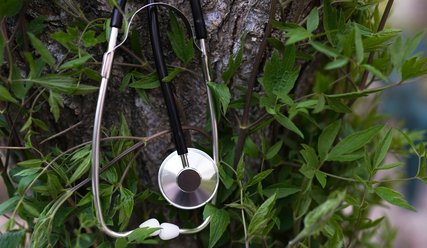Gisborne GP has a passion for the holistic approach
For Gisborne GP Dr Patrick McHugh, medicine is about considering body, mind and soul and gaining an understanding of the whole person, not just treating a set of symptoms or complaints.
This approach has seen him involved in various research studies, one of which explored what potential benefits a plant-based diet could give to those who were overweight and suffered heart problems or diabetes.
“The results were really eye-opening,” Patrick says. “Over the 12-week study, where participants learned how to prepare and cook plant-based meals, we found energy levels soared, excess body weight was lost and it helped lessen the impact diabetes has on the body.”
His passion for taking a lifestyle approach to medicine, focusing on the foundations of health such as diet, regular exercise, quality sleep and reducing stress, was a key factor in his decision to become a GP after first choosing hospital medicine as his career path.
“After graduating in 1987, I ended up doing some GP locum work and very quickly realised that this was the lifestyle I wanted, one where there was a great quality of life and the opportunity to gain a deeper understanding of human dynamics,” he says. “For me, being part of people’s lives and having a meaningful relationship with your patients is what the joy of medicine is all about.”
He has stayed in Gisborne ever since, running his own practice for a while as well as taking on a GP liaison role for the Tairawhiti District Health Board for nearly a decade. During this time, 36 young doctors have started their GP training in Gisborne with at least 18 still living and working in the community.
“When I started as GP liaison, the area badly needed GPs and so we launched a recruitment and retention programme.” says Patrick. “It’s been very successful with close to half of our local GPs having been through it, or who are going through it now.”
“It was very satisfying work, but challenging due to the number of parties required to get on the same page. There are real challenges in having a balanced number of trainees - intakes tend to be feast or famine depending on the year.”
Patrick also works part-time in the local Emergency Department, and becomes frustrated by the numbers of cases he sees clogging up the system when the issue could be dealt with at a GP clinic.
“So many of these cases are given the hospital approach, which is wholly process-based with tests and investigations, when a GP can find a different picture when they look at the person as a whole, as a member of the community.”
Patrick has also been pivotable in bringing a more holistic approach to modern medicine. He is a proponent of Bowen Therapy, which uses acupressure to help the body to heal, as well as Buteyko, a breathing technique developed in Russia which can bring big improvements for asthmatic patients.
The concept of caring for a ‘whole person’ is also a driver in the Tairawhiti Interprofessional Education (TIPE) programme, of which Patrick was until very recently the academic leader. This brings students from different health disciplines together to learn from, with and about each other.
Launched in 2012, more than 350 final-year dental, dietetic medical, nursing, occupational therapy, physiotherapy, oral health, speech language therapy, paramedicine, social work and pharmacy students have taken part.
“Training the people who will care for us in different silos will not achieve a whole being approach” says Patrick. “The TIPE programme doesn’t train them how to do all the different things, it teaches them how to work together, as a team, to hopefully bring about better outcomes for the patient.”
When the local Poverty Bay rugby team pull on their jerseys on game day, it’s time for Patrick to don yet another hat – as rugby doctor.
“When I came back to Gisborne, a friend who played for the team took me along one day and I got shoulder-tapped,” he laughs. “Mind you, I’m a better rugby doctor than a player - my skill is not matched by my enthusiasm which makes me less than average on the field.”
It is clear that Patrick really found his place in the world when he became a rural GP with its emphasis on community-centric medicine.
“Way back in the beginning I wanted to be the master of my own destiny and, by and large, the provincial and rural life has allowed me to do that,” he says.
Related

11 September 2025 | College and members
GPs want patients to be seen, heard and known

21 May 2025 | College and members
Budget 2025 opinion: We don't need to create a new health service, we need to invest in the current one

26 March 2025 | College and members